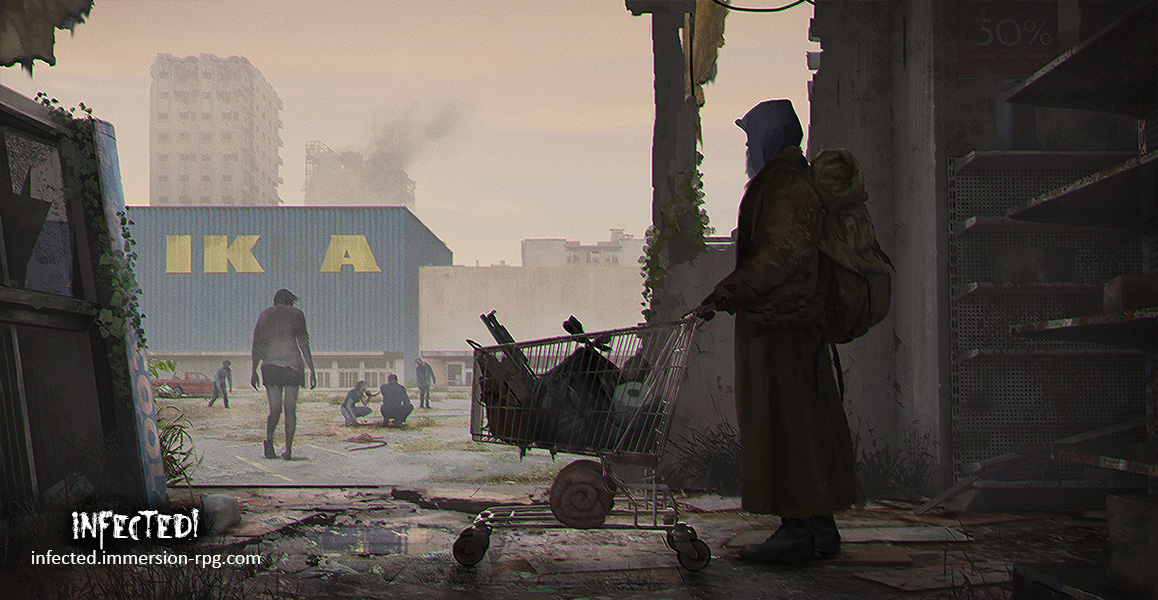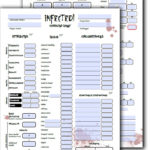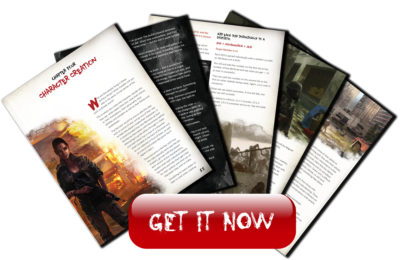
14 Sep Tips to Make Awesome Characters in Infected
I played a great one-shot game on the weekend, with two of my good mates. One of them has been playing with me for a little while, though the other had never played Immersion before, and was more used to playing D&D and Pathfinder. I found this a great opportunity to test out the game, see how easy it was for him to understand it and to see where I could improve.
One thing I realised (again), was that because Immersion is so different to many other games out there it can take a little bit for players to get used to it. D&D in particular, with its focus on combat and levels, is like a different world to Immersion, where you can make any sort of character you want.
The advantage of Immersion RPG is that it has no limits, and you can make any character you want – from a destitute vagrant, to a sorcerous king, and anything in between. However, that can also be its disadvantage, if players don’t understand what spirit they should approach the game in. Which is: imagine that you’re telling a story, or making a movie – what characters would you like to see in that story? What sort of story are you telling? It is about far, far more than what weapon they use, or how good they are at fighting.
In combat-focused games, characters can quite often be characterised as being, “A half-orc fighter with an axe” or “A paladin with a shield and sword,” or “A thief who throws knives.” Basically, they’re a class and a weapon, or combat style. Of course, a lot of people make backstory, and get really into their characters, which is awesome! However, it doesn’t always translate into the character sheet, or skills that they have. D&D is in many ways a tactical combat game at heart (which is how Gary Gygax designed it from the outset).
Immersion, on the other hand, is more story focused. Players can make their characters combat-focused and powerful if they wish, though they should also spare a thought for how they survive in communities, with other people, how they make a living and so on. Combat can be swift and dangerous, like in real life, however if you’ve got the diplomacy and tact of a dribbling maniac… well, you probably won’t last very long.
So here’s the first tip:
1) Double-Check Social Skills
When the Narrator checks the character sheets of their players, they should check over the characters’ social skills. Command, Diplomacy, Deception, Deduction, Intimidation, Language and Perform.
When my friend first gave me his sheet, it focused on a number of pets (an eagle, horse and dog), and combat skills, but his Command was 0, Diplomacy 1, Deception 0, Deduction 0, Intimidation 3, Language and Perform 0.
I explained what this meant for his character:
“You do understand that a Command of 0 means that you are utterly unimpressive, right? No one ever listens to you, you get pushed around, you don’t get your own way, and so on. With a Diplomacy of 1, you’re an embarrassment or disgrace to most places you visit. You’d be lucky to buy a loaf of bread without being assaulted for your atrocious manners. There’s simply no way that you could survive in an “Infected” community at all, or have anything to do with them. With a Deduction of 0 you’re utterly gullible. Literally, you will believe almost anything people say. Somehow I think that to survive you must have acquired some social skills. And you’ve got scars all over your body – how are you not an impressive and formidable guy? I somehow think that your Intimidation should be a bit higher.”
This made sense to him, and he changed things around a bit.
Now, that’s not to say that you can’t have really low stats on such skills. But when faced with the reality of the situation, most people realise that it’s a pretty brutal handicap. It also happens quite often – combat skills appear to be more important at first glance (though when we played Keep Your Friends Close, the most used skills were Diplomacy, Deduction and Intimidation).
2) Circumstances Should Make Sense
Circumstances are a very unusual stat. There are a few games that have stats like this, but many don’t at all, and it’s completely foreign to someone who has only ever played D&D.
Simply put, Circumstances are things like fame, resources, societal ranking, allies, pets, and so on.
They can be tricky for a Narrator to work out, because they do rely entirely on logic. Each Narrator will likely use them a little differently.
Personally, I use them very flexibly. Of late, I’ve simply been lumping Equipment, Weapons and Wealth together as “Resources” and just working out what seems logical. I tend to be generous rather than stingy. For example, the new guy had Resources of 6 – so I discussed it with him and decided he had a crossbow, 50 bolts, a light handgun with 3 clips, and 100 rounds for it, 300 silver scraps (currency) or trade worth that amount, and a suit of heavy ballistic plate (+6/+6 Absorb, HR 3), as well as a hatchet a backpack, clothes, survival gear and food, and sundry other bits and pieces.
The other character had Resources of 5 and wound up with a 200 silver scraps, a heavy rifle with a scope, 3 clips for it, 150 rounds, battered ballistic plate (+5/+5 Absorb, HR 3), a light pistol and 80 rounds, food, flares, a combat knife and some random other gear.
Generally, instead of writing down every single piece of equipment they have, if they later ask me, “Oh, do I have some rope,” or “Do I have a few plastic bags?” I just get them to make a Luck/Resources check (with a penalty, for really rare stuff).
I used to be a real stickler on exactly how much stuff someone has, but these days I have discovered it doesn’t greatly affect the story. They’ve just got to work out what they do with their stuff in the game, explain how they got it (if it’s rare or exceptional), and so on. In the game they often scavenged weapons and gear from other people, but then had to lug them around, slowing them down and making them tired. In the end they left most of it behind and only kept the really valuable stuff, to trade with later (no bags of holding here!).
I have had players who wanted dozens of guns, explosives, small tanks and so on. I had no problem with it, and found it didn’t affect the game much at all – though sometimes scenarios would ensue out of thieves making off with their gear, con men looking to make a profit, or small warlords wanting to “tax” them. Fun times!
Players should have a think about who their character is – how do they survive? Do they have contacts and friends? If they’re rich, how did they become so? Surely they would need to know people, and have some sort of reputation, unless they just stole it (in which case, they should probably take the Enemy flaw)?
3) How Do They Live?
The new character started off as someone just living in the wilderness, by himself with his animals. But then we worked on some backstory – he had been a former marine, came home, kept his little girl fed and clothed with basic work – then the outbreak happened and he did his best to protect her and his wife. When the wife got killed in a community scuffle, he fled with the daughter, and survived in the forested hills of the Appalachians. However, he always wanted what’s best for her, and would trade with local communities, build up trust, get supplies from those places – and eventually became an ally of a train community passing through (which connected him with the other character). Now they call on him from time to time, paying him well, giving him things, and asking for his help in gaining passage through the mountains.
All of a sudden, his social skills were valuable! How was he going to talk to people without them? His pets dwindled from three mediocre ones down to one high-level dog, a wolfhound at level 8 – utterly obedient and invaluable for tracking (he made a huge difference in the game – detecting Infected, detecting explosives, tracking down their quarry again and again, defending the character against Infected).
Now the player was thinking from his character’s perspective, and when we started gaming, it made a huge difference. The character made sense, and he could really roleplay him to the hilt!
4) Disadvantages
Disadvantages is also an area that can be manipulated if you’re not careful. The Narrator should ensure that whatever Disadvantages characters do take, they will affect the game directly in some way. Taking a Dark Secret is only relevant if it will be known by someone in the game, who can then expose it – with disastrous consequences. Particularly in one-shot games, you should only allow those Disadvantages that are relevant.
Sample Characters
This has given me the idea that I should provide sample characters at the end of each of my new scenarios, so I will be making several. I’ve also made a few and attached them here, so if you want to check out some more characters, and see how we’ve designed them.
I hope you like them!
That’s all from me today! I hope you like the article, and if you have any suggestions, rumours, or comments, please feel free to pop them down below, or shoot me an email at oliver (at) immersion-rpg.com.
~Oliver R. Shead
Like what we do? Want to play your own games set in a harsh, realistic post-apocalyptic world, where the zombies aren’t just fast, they’re also smart?
Well, we can help you with that!
Check out a PDF copy of our book Infected! It’s only $15.00 AUD – a price that some people have told me is totally absurd. I agree – and I’m sticking with it!
It’s filled with epic, full-colour art that wouldn’t look out of place in a computer game or movie, with flexible, simple rules that yet retain a high level of depth.
Check it out!




No Comments